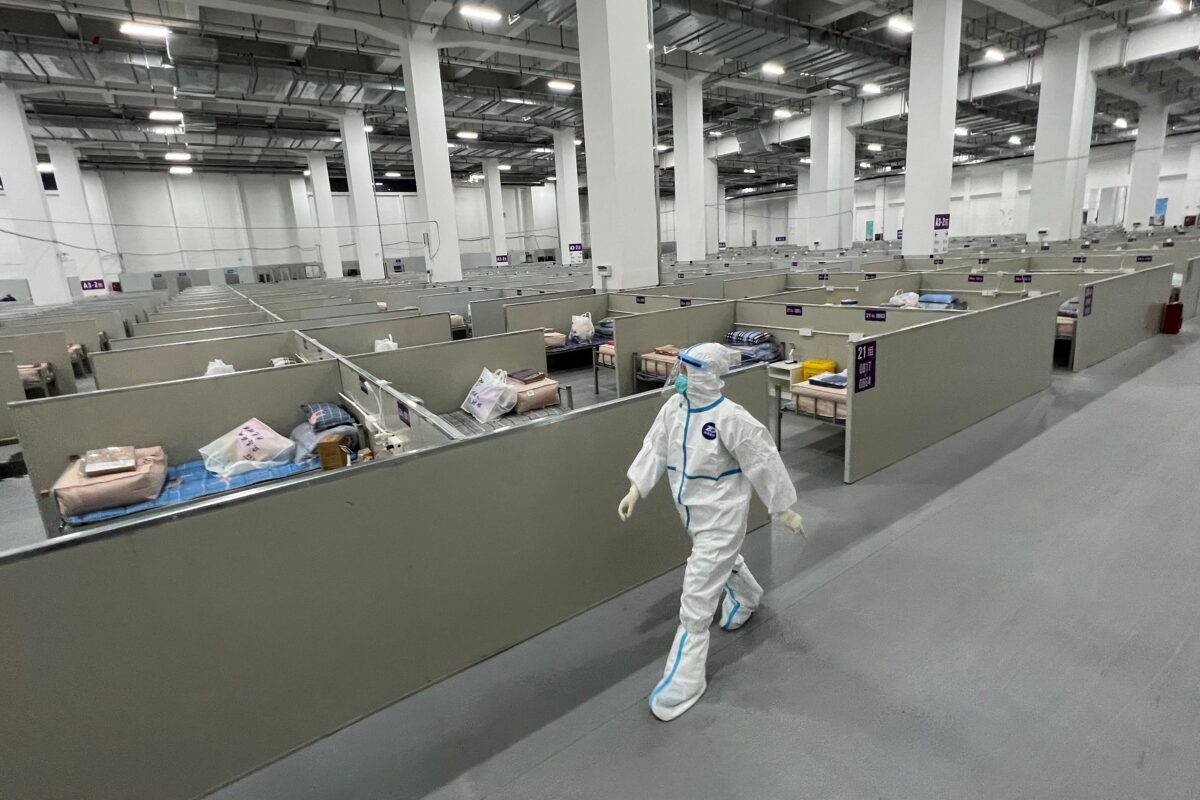
A staff member walks inside a makeshift hospital that will be used for COVID-19 patients in eastern China’s Shanghai on April 7, 2022. (STR/AFP via Getty Images)
By and
The extremely strict lockdown that Beijing officials have imposed on Shanghai and other cities in recent weeks may be aimed at sending a message to the United States and aligned powers about their dependence on Chinese supply chains, said Brian McCarthy, chief strategist at investment firm Macrolens LLC.
The two-phased lockdown in Shanghai began to take effect on March 28, and has yet to be lifted. Chinese officials implemented it in defiance of projections that it would cost China’s economy $29 billion in two weeks alone. But the cost to the United States and aligned nations may be even greater, in McCarthy’s view.
Speaking to EpochTV’s “China Insider” program on April 4, McCarthy said that disruptions to global supply chains are particularly problematic and make U.S. weaknesses all the more evident at a time when inflation has been surging. McCarthy suggested that Chinese officials are fully aware of America’s economic woes and have chosen this juncture to illustrate the vulnerabilities of the U.S. economy.
“We really are ill-equipped to deal with any further supply-chain disruption. So, you know, they really have us in a pickle, [especially] with COVID-19,” McCarthy said.
But McCarthy stopped short of blaming the virus’s outbreak on Chinese Communist Party malice or mishandling as some have done.
“I think ultimately it was an act of nature, I don’t think it was done on purpose, but it’s very clearly left China in a much stronger position relative to the West, which is dealing with crippled supply chains, and it looks like we’re going to be dramatically escalating prices for food and energy,” he said.
McCarthy suggested that Chinese leader Xi Jinping has sought to drive home the fact of western dependence on China’s supply chains to give himself leverage as he continues to pursue an expansionist agenda targeting Taiwan in particular. Failures to stand up to Xi in the past have emboldened him to take further aggressive actions in 2023, 2024, or 2025, McCarthy said.
“Look at what happened in Hong Kong. The United States hasn’t given Xi Jinping much more than a slap on the wrist for effectively destroying any semblance of democracy in Hong Kong,” he said.
For all that Xi may wish to illustrate U.S. weaknesses, the economy of China has serious problems of its own, centered largely on a real estate sector based heavily on credit. McCarthy said he expects to see a continued decline in turnover and prices in the real estate sector.
“Real estate is the primary form of collateral against all credit in China. So there are very severe headwinds to credit creation. And despite the external inflationary pressures, the internal dynamic in China is going to be powerfully deflationary,” McCarthy said.
McCarthy described an economy heavily centered on a compromised housing bubble. People across China have paid for assets that are currently worth about 30 percent of their purchase price, he said.
“They wasted a lot of real resources, building stuff that nobody’s going to use. That is a reality that there are no two ways around,” he said.
David Zhang is the host of China Insider on EpochTV. He is currently based in New York and Washington DC covering China-related news. He focuses on expert interviews and news commentary on China affairs, especially issues regarding the U.S.–China relationship.